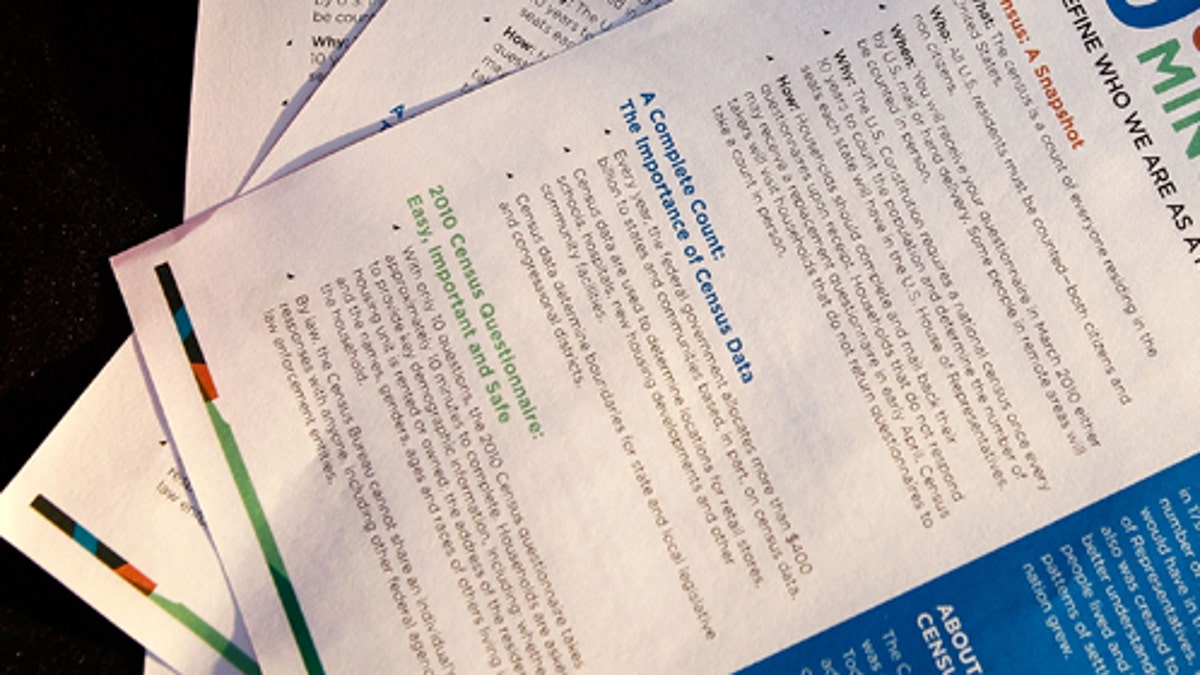
WASHINGTON - APRIL 01: Forms for Census 2010 are displayed during an event to promote the census at Ben?s Chili Bowl April 1, 2010 in Washington, DC. The event was held to encourage DC residents to participate in the census. (Photo by Alex Wong/Getty Images) (2010 Getty Images)
After a heated debate over a proposal by the U.S. Census Bureau to reclassify Latinos as a race, Hispanic groups said they are working with the federal agency to figure out whether changes are necessary or not.
The proposal, which would eliminate the need for Hispanics to pick between two races (white or black), drew the ire of groups who insist Hispanics are an ethnicity, not a race. The proposed changes, which were announced last August but would take effect in the 2020 Census, would also end the use of the term "Negro," and offer new ways to identify Middle Easterners.
Angelo Falcon, president of the National Institute for Latino Policy in New York City and a community adviser to the Census, says his group has begun to reach out to various organizations and civil rights groups.
“The idea is to bring these people together,” Falcon told Fox News Latino, adding that he thinks the U.S. Census Bureau should base its decision on research. “We want to make sure we have our research [and include] the community and the [think tank] Pew Hispanic Center.”
The recommendations to change U.S. Census forms stem from new government research on the best ways to count the nation's demographic groups. But it has faced resistance from some racial and ethnic groups which worry that any kind of wording changes in the high-stakes government count could yield a lower tally for them.
The research is based on an experiment conducted during the 2010 census in which nearly 500,000 households were given forms with the race and ethnicity questions worded differently.
Stacy Gimbel Vidal, a spokeswoman for the U.S. Census Bureau, said the bureau is actively working on the “implementation of the 2010 alternative questionnaire experiment research.”
“Many racial and ethnic communities and leaders have been consulted with throughout the design and implementation of the 2010 alternative questionnaire experiment research,” she wrote in an e-mail. “This is a part of a continuing process in which we seek feedback from the public and stakeholders openly and uniformly.”
The findings show that many people who filled out the traditional form did not feel they fit within the five government-defined categories of race: white, black, Asian, Pacific Islander and American Indian/Alaska Native.
When questions were altered to address this concern, response rates and accuracy improved notably, she said.
Falcon said this is the first time the Census has tried to experiment with how they classify Latinos – and the proposal was the first step in that direction.
“I’m finding many Latino researchers have a problem with that,” he said.
He said the Census Bureau also has another problem – Latinos are underrepresented in the agency. He said the lack of Hispanics in the bureau could impact how sensitive it is to the Latino culture.
Vidal said the agency has made a concerted effort to reach out to Latino groups and to better understand the culture. From what she has seen, Hispanics overwhelmingly favor its proposal to reclassify the designation, she said.
“[They] felt it presented equity to the different categories, as each major group received a checkbox, with examples, and a write-in line where detailed responses could be provided,” she said.
“Hispanic” has long been defined as an ethnicity and not a race. Because of this terminology, some 18 million Latinos — or roughly 37 percent — used the "some other race" category on their census forms to establish a Hispanic racial identity in 2010.
Vidal said the U.S. Census Bureau faces “many challenges,” but it is “committed” to “improving census results by expanding our understanding of how people self-identify their race and Hispanic origin.”
“The Census Bureau and the federal statistical system face many challenges,” she said. “Including a growing number of population groups who find the current race and ethnic classification system confusing if not irrelevant, to their life experience, or who wish to see their own specific group highlighted on the Census questionnaire.”
Some African-Americans in 2010, for instance, criticized a question asking if a person was "black, African American or Negro," saying the government's continued use of the term "Negro" was demeaning and offensive.
“We’ve been asking the Asian and Black community to get involvement,” Falcon said. “We haven’t seen anything, any movement.”
Nicholas Jones, chief of the racial statistics branch at the Census Bureau, said the government's more recent research found that Latino response rates were similar under both the current and the new proposed format.
Across all race and ethnic groups, the non-response rates dropped notably to 1 percent under the proposed change, compared to non-response rates of roughly 4 to 5 percent with the traditional form.
Falcon said that an important issue is that there should be a more engaging conversation within the Latino community about the way in which the U.S. Census identifies Hispanics.
“Latinos should be looking at the Census once every 10 years,” he said. “The Census is so important.”
The Associated Press contributed to this report.
Follow us on twitter.com/foxnewslatino
Like us at facebook.com/foxnewslatino







































